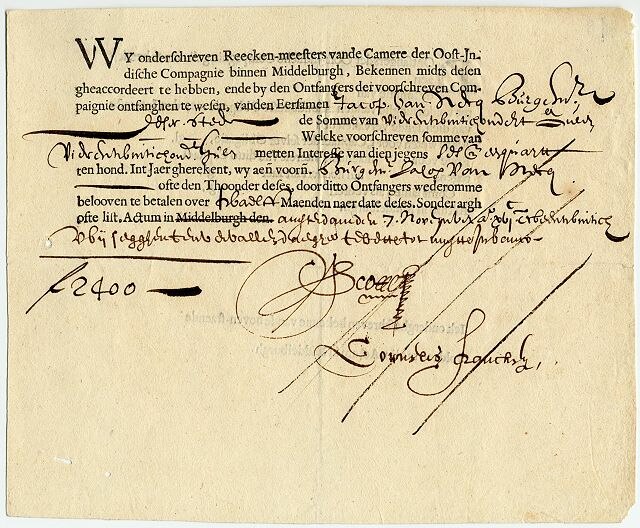Corporate law is the body of law governing the rights, relations, and conduct of persons, companies, organizations and businesses. The term refers to the legal practice of law relating to corporations, or to the theory of corporations. Corporate law often describes the law relating to matters which derive directly from the life-cycle of a corporation. It thus encompasses the formation, funding, governance, and death of a corporation.
Hogarthian image of the South Sea Bubble, by Edward Matthew Ward, Tate Gallery
"Jack and the Giant Joint-Stock", a cartoon in Town Talk (1858) satirizing the 'monster' joint-stock economy that came into being after the Joint Stock Companies Act 1844
A bond issued by the Dutch East India Company, dating from 7 November 1623, for the amount of 2,400 florins
Adolf Berle in The Modern Corporation and Private Property argued that the separation of control of companies from the investors who were meant to own them endangered the American economy and led to a mal-distribution of wealth.
A corporation is an organization—usually a group of people or a company—authorized by the state to act as a single entity and recognized as such in law for certain purposes. Early incorporated entities were established by charter. Most jurisdictions now allow the creation of new corporations through registration. Corporations come in many different types but are usually divided by the law of the jurisdiction where they are chartered based on two aspects: whether they can issue stock, or whether they are formed to make a profit. Depending on the number of owners, a corporation can be classified as aggregate or sole.
McDonald's Corporation is one of the most recognizable corporations in the world.
1/8 share of the Stora Kopparberg mine, dated June 16, 1288
"Jack and the Giant Joint-Stock", a cartoon in Town Talk (1858) satirizing the 'monster' joint-stock economy that came into being after the Joint Stock Companies Act 1844
Lindley LJ was the leading expert on partnerships and company law in the Salomon v. Salomon & Co. case. The landmark case confirmed the distinct corporate identity of the company.







